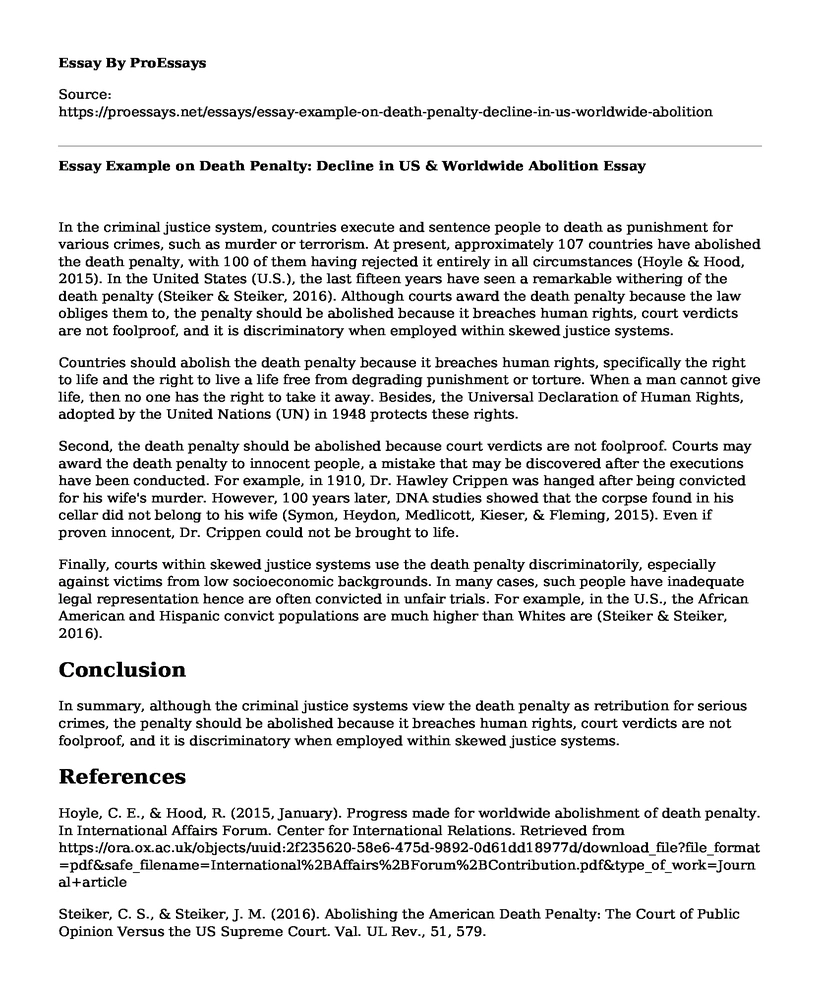In the criminal justice system, countries execute and sentence people to death as punishment for various crimes, such as murder or terrorism. At present, approximately 107 countries have abolished the death penalty, with 100 of them having rejected it entirely in all circumstances (Hoyle & Hood, 2015). In the United States (U.S.), the last fifteen years have seen a remarkable withering of the death penalty (Steiker & Steiker, 2016). Although courts award the death penalty because the law obliges them to, the penalty should be abolished because it breaches human rights, court verdicts are not foolproof, and it is discriminatory when employed within skewed justice systems.
Countries should abolish the death penalty because it breaches human rights, specifically the right to life and the right to live a life free from degrading punishment or torture. When a man cannot give life, then no one has the right to take it away. Besides, the Universal Declaration of Human Rights, adopted by the United Nations (UN) in 1948 protects these rights.
Second, the death penalty should be abolished because court verdicts are not foolproof. Courts may award the death penalty to innocent people, a mistake that may be discovered after the executions have been conducted. For example, in 1910, Dr. Hawley Crippen was hanged after being convicted for his wife's murder. However, 100 years later, DNA studies showed that the corpse found in his cellar did not belong to his wife (Symon, Heydon, Medlicott, Kieser, & Fleming, 2015). Even if proven innocent, Dr. Crippen could not be brought to life.
Finally, courts within skewed justice systems use the death penalty discriminatorily, especially against victims from low socioeconomic backgrounds. In many cases, such people have inadequate legal representation hence are often convicted in unfair trials. For example, in the U.S., the African American and Hispanic convict populations are much higher than Whites are (Steiker & Steiker, 2016).
Conclusion
In summary, although the criminal justice systems view the death penalty as retribution for serious crimes, the penalty should be abolished because it breaches human rights, court verdicts are not foolproof, and it is discriminatory when employed within skewed justice systems.
References
Hoyle, C. E., & Hood, R. (2015, January). Progress made for worldwide abolishment of death penalty. In International Affairs Forum. Center for International Relations. Retrieved from https://ora.ox.ac.uk/objects/uuid:2f235620-58e6-475d-9892-0d61dd18977d/download_file?file_format=pdf&safe_filename=International%2BAffairs%2BForum%2BContribution.pdf&type_of_work=Journal+article
Steiker, C. S., & Steiker, J. M. (2016). Abolishing the American Death Penalty: The Court of Public Opinion Versus the US Supreme Court. Val. UL Rev., 51, 579. https://scholar.valpo.edu/vulr/vol51/iss3/3
Symon, V., Heydon, S., Medlicott, N. J., Kieser, J., & Fleming, J. S. (2015). Before CSI: Making the case for a novel portrayal of Forensic Science. The Int J Sci Soc, 2007(6), 7-15. Retrieved from https://www.researchgate.net/publication/279455883_Before_CSI_Making_the_Case_for_a_Novel_Portrayal_of_Forensic_Science
Cite this page
Essay Example on Death Penalty: Decline in US & Worldwide Abolition. (2023, Feb 27). Retrieved from https://proessays.net/essays/essay-example-on-death-penalty-decline-in-us-worldwide-abolition
If you are the original author of this essay and no longer wish to have it published on the ProEssays website, please click below to request its removal:
- Examples of Human Rights Violations Around the World
- Essay on Equity in Health and Social Care
- Paper Example on Panama Canal
- Research Paper on Private Prisons in the US
- The Unlicensed Reproduction of Copyrighted Media Essay
- Criminal Behaviors: Isolation in the Community as Punishment - Essay Sample
- King Henry : The Great King of England Who Defined Foreign Policy - Free Paper Example







